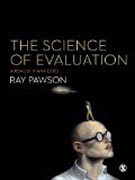
Evaluation researchers are tasked with providing the evidence to guide programme building and to assess its outcomes. As such, they labour under the highest expectations - bringing independence and objectivity to policy making. They face huge challenges, given the complexity of modern interventions and the politicised backdrop to all of their investigations. They have responded with a huge portfolio of research techniques and, through their professional associations, have set up schemes to establish standards for evaluative inquiry and to accredit evaluation practitioners. A big question remains. Has this monumental effort produced a progressive, cumulative and authoritative body of knowledge that we might think of as evaluation science? This is the question addressed by Ray Pawson in this sequel to Realistic Evaluation and Evidence-based Policy. In answer, he provides a detailed blueprint for an evaluation science based on realist principles. INDICE: Preface: The Armchair Methodologist and the Jobbing ResearcherPART ONE: PRECURSORS AND PRINCIPLESPrecursors: From the Library of Ray PawsonFirst Principles: A Realist Diagnostic WorkshopPART TWO: THE CHALLENGE OF COMPLEXITY - DROWNING OR WAVING?A Complexity Checklist Contested Complexity Informed Guesswork: The Realist Response to ComplexityPART THREE: TOWARDS EVALUATION SCIENCE Invisible Mechanisms I: The Long Road to Behavioural Change Invisible Mechanisms II: Clinical Interventions as Social Interventions Synthesis as Science: The Bumpy Road to Legislative Change Conclusion: A Mutually Monitoring, Disputatious Community of Truth Seekers
- ISBN: 978-1-4462-5243-7
- Editorial: SAGE Publications Ltd
- Encuadernacion: Rústica
- Páginas: 240
- Fecha Publicación: 18/02/2013
- Nº Volúmenes: 1
- Idioma:
